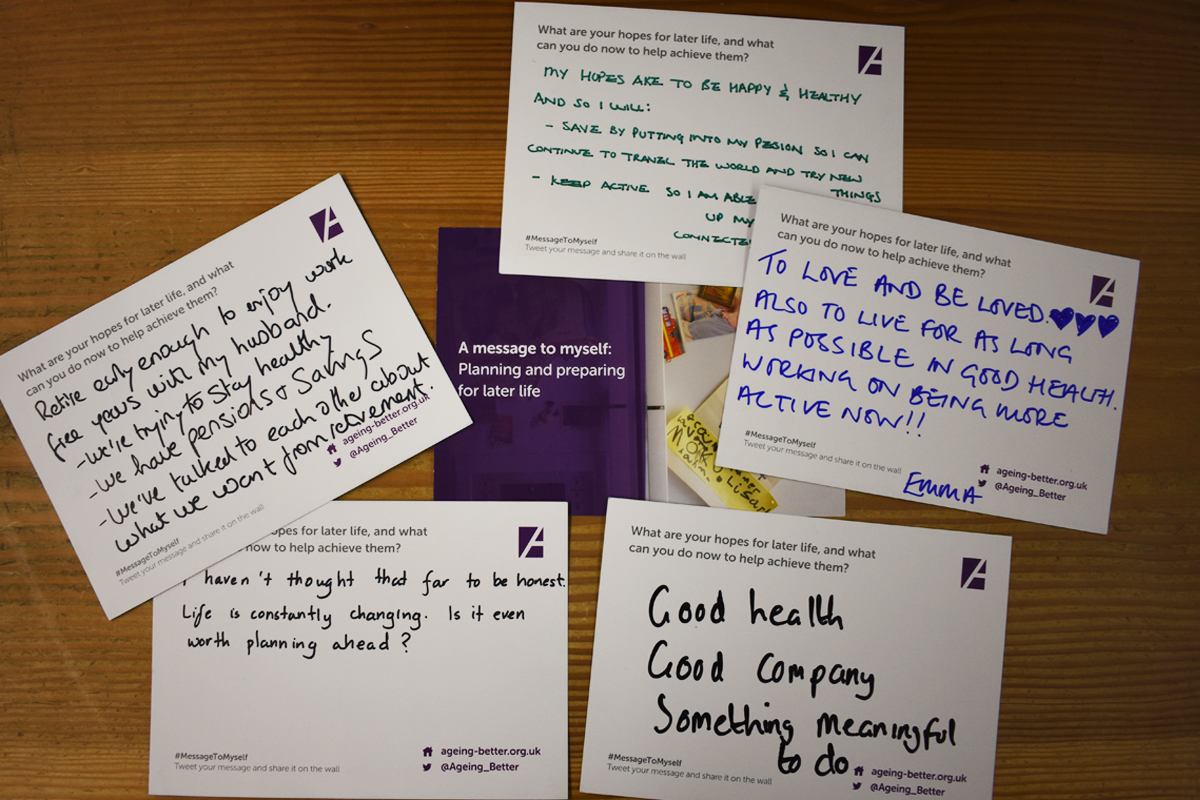A message to myself: planning and preparing for later life

We held a panel event that explored what enables people to plan for their later lives, and the challenges they may face along the way.
The event, chaired by presenter and financial journalist Paul Lewis, launched our new research on planning and preparing for later life.
We’re living longer, which should be a huge opportunity for us all. But can we prepare for later lives, and how can it be done? There is widespread and common-sense based perception, backed to some extent by evidence, that planning and preparing for later life is associated with increased wellbeing at older age. But many people at mid-life have not thought much about their later life, nor taken fundamental future-oriented actions, such as engaging in financial planning or writing a will.
For some, later life may be a distant future that doesn’t need to be thought about until, well, later. For others, it’s right around the corner and is the next stage in their lives. At the event we looked at general trends and encouraged attendees to make some personal reflections about their own lives.
The event marked the launch of our research on planning and preparing for later life, conducted by Anglia Ruskin University. The report is a summary of the evidence that exists about who does or doesn’t plan for the future, what the barriers and enablers might be to planning, and what might work to help people plan more.
Read our series of blogs on planning and preparing for later life
Read moreMeet our speakers
Dr Claire Preston, Anglia Ruskin University
One of the authors of the report, Claire talked us through the methodology and summarised the enablers and barriers the research team found as part of this work.
View Claire's slides:
Our Chair was Paul Lewis, Financial journalist, broadcaster and presenter of Radio 4’s MoneyBox
Panellists
- Claire Turner, Director of Evidence, Centre for Ageing Better
- Matthew Blakstad, Head of NEST Insight Unit, NEST
- James Walsh, Policy Lead: Engagement, EU & Regulation, Pensions and Lifetime Savings Association
- Allyson Whisker, Citizens’ Advice
The very first question asked from our audience was about money. How do we get more people to save like they should or need to? The modern world is very demanding of the present: the ‘I want’ culture is very immediate, particularly for consumables. Do we need to do more to encourage people to save for their future selves rather than spend on their present selves? On the surface this seems a reasonable train of thought, but for many people this may not be realistic. Many millennials who need to start their planning, and people in mid-life who are ‘just about managing’ are living precariously: the most urgent needs are to make current ends meet. When you can only just afford to live now, the concept of planning for the far future may seem to be a luxury for a fairy tale existence that’s out of reach.
Matthew Blakstad highlighted that planning for later life is broader than finance. As humans we are “short-term animals”. Any interventions need to offer a reward for people today as well as in the future – this may be the only way to actually get people to properly plan. He summed this up nicely:
I want to be slimmer next week, but the hamburger is delicious today
However, he also stressed that those who are on low incomes are actually “some of the best planners you’ll ever meet” – but not for later life; they need to make numerous complex decisions about the day to day and simply don’t have the capacity to consider the future.
Claire Turner gave us three key considerations, particularly for people who are in mid-life:
- The capacity of individuals is hugely important. Do people have the means and ability to take stock and plan? This needs to be considered in a wider social context
- Look beyond financial planning. There is more to life than money; how do we get people to think and talk about: where they want to live in later life, what they might consider to be a ‘good’ death, or simply what they want to do with the rest of their life?
- Should we remove choice from some things? For example, should there be an auto-enrolment for social care or a standard will?
Allyson Whisker urged organisations and services to work together to provide people with all the advice and services that they need. There’s no one stop shop for what everyone might need in their later lives, but with the right dialogue between organisations people can be signposted to the information that they need.
Returning to finances, James Walsh suggested outlining realistic targets to help people save might work. Inviting individuals to imagine what kind of lifestyle they’d like to have in retirement (the beverage analogy he used ranked from luxury “I’d like to enjoy a glass of expensive wine with my dinner” to basic “I don’t mind the home brew”) has worked in Australia, so could potentially work here too.
Positive age stereotypes may help?
Our own internal ageism may be a barrier. People don’t want to think about getting older, according to Allyson Whisker. If you’re healthy and able-bodied you might not want to think about being frail or needing care, and you certainly won’t want to think about your own mortality. The negative narrative around ageing does not encourage people to think in a constructive way about their future selves.
“Let’s go out to dinner and discuss death”
The great taboo: death and dying. It is an inevitable part of life, but is something that we prefer to avoid talking about. Could the secular society that we live in perpetuate this ‘taboo’ and therefore prevent people from talking openly and practically about it?
Many heads are better than one
If we want to encourage people to plan, perhaps group discussions may be an answer. Sharing knowledge and thoughts in an open forum might help people to consider other angles they’d not thought of. For some, the thought of doing something purely for themselves is an alien concept, so having another person be their motivator might just be the catalyst they need.

We asked attendees: What are your hopes for later life, and what can you do now to help achieve them?
Themes
- Finance. Unsurprisingly this was the most popular theme. Most people highlighted the need to fund their ideal retirement plans and were keen that they start or continue saving so that they can have the lifestyle they want.
- Building and maintaining social connections. For many, this is an important part of current life and is an essential thing for their future selves.
- Health and happiness. Simple but so important, and often relative to other factors. People value their individual wellbeing and wanted to remind themselves to take steps to stay healthy and happy
- End of life. At the very end, most of us just want a ‘good’ death. What this means to each of us is different, but if you start the conversation early enough – and with the right people – it might just be what’s needed at a difficult time.
Watch the recording of the live stream:

